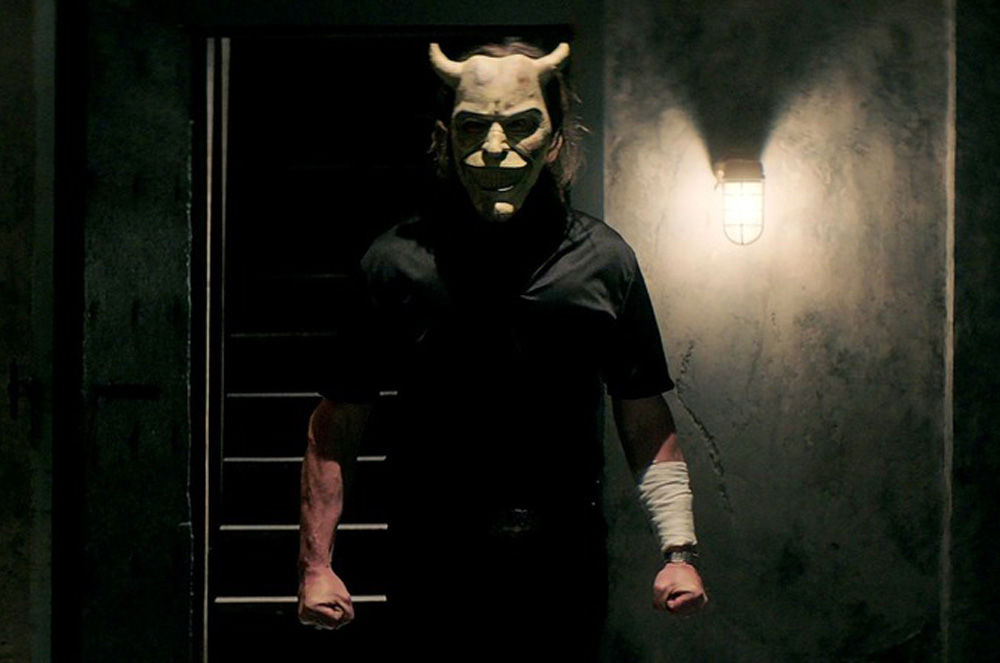It’s a refreshing element of “The Black Phone” that there’s never some full explanation of why the titular object actually rings, its wires cut off and the villain of the film (Ethan Hawke) assuring Finney (Mason Thames), the boy he’s locked in his basement that it hasn’t worked since he was a child. And yet in this adaptation of Joe Hill’s short story, there’s a dial tone as Finney starts imagining how he’ll get out of such a desperate predicament, hearing the voices of others he knows have been abducted recently in his neck of Northern Denver where police search fruitlessly for the thug known only as the Grabber, and if it’s the fear of the unknown that makes the situation particularly trying, it’s only fair that what’s unknown could also end up getting Finney out of trouble.
Although nearly any film in the horror genre ends with characters overcoming fear, “The Black Phone” is a rare one to actively consider the steps it takes to get there, putting Finney in an even deeper hole at the start than the Grabber ever could, in a family that lost its matriarch while he and his sister Gwen (Madeleine McGraw) were barely out of the womb. Left in the care of an abusive father (Jeremy Davies) who is also left reeling by the death of his wife, Finney is no less threatened at home as he is at school where he’s become an easy mark for bullies, but while there’s no clear path for him to get out of his daily life, the unfortunate circumstance of being kidnapped inadvertently allows him to find the strength within himself to persevere when he can clearly see the four walls in front of him and the calls that come in on the phone.
Subsisting on toilet water and finding alternate uses for the rocketship penlight that the Grabber somehow doesn’t think to take, Finney’s resourcefulness is an extension of what director Scott Derrickson and co-writer C. Robert Cargill are able to pull off with the film’s limited setting, though following up “Doctor Strange” with something far more lean and mean can’t exactly be described as modest by comparison when Pink Floyd’s “On the Run” can be afforded to help set the mood for the 1978-set film. In fact, Derrickson brings to bear experience surely honed on larger-scale productions with the sly camera maneuvers to bring the voices guiding Finney into the room with him as much as what creeping fears he has, as well as that of his own upbringing, setting the film in the rough-and-tumble community he grew up in himself where it’s telling that for as many vicious acts of physical violence occur, none of which are soft-pedaled even between kids on the schoolyard, bruises seem far easier to heal from than the psychic toll they take.
“The Black Phone” can also afford a top-of-the-line cast, with Hawke serving as a haunting presence throughout, even if he’s usually lingering in the imagination upstairs — his rare appearances largely concealed in startling Tom Savini and Jason Baker-designed masks — and Thames and a scene-stealing McGraw, whose Gwen is the most precocious potty mouth you’ve ever seen, able to create such a strong bond as siblings to support one another in spite of their relatively limited screen time together. You know you’ve got something pretty good going when the film has already entertained for an hour before James Ransone shows up as a local obsessed with finding the Grabber’s whereabouts, and while the film is a bit of an anomaly as a Blumhouse production, leaning a bit more Amblin if Spielberg has ever allowed for his productions to go out with an R rating, it delivers an enjoyably grisly finale that makes you feel like a kid again, for better or worse.
“The Black Phone” opens in wide release on February 4th.




